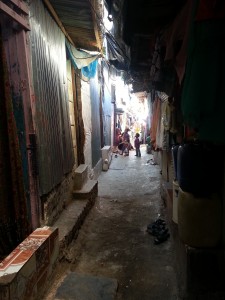From 2013-2014, the TATA Institute of Social Sciences is collaborating with the Children’s Environments Research Group of the City University of New York to implement child friendly community assessment and planning initiatives in Mumbai as part of its M-Ward Initiative, with support from the Bernard van Leer Foundation. The primary goal of the project is to train community members to assess and improve the conditions of children aged 0-18 living in the communities of Vashi Naka and Mankhurd.

Child friendly community development approaches are needed in India, especially in Mumbai where families struggle to support their children’s healthy development in physical environments that are insecure and inadequate for their well-being and development. Child friendly community initiatives are designed to raise the quality of planning for children in cities by providing resources for communities and municipal governments to better assess and monitor conditions for children. A child friendly community is one in which children’s rights are integrated into urban planning schemes and community improvement processes to ensure children’s protection, participation, and an adequate provision of services at the local level.
The primary activities of the project include: 1) participatory workshops with teachers, parents, youth, and other local leaders to build their capacity to implement a child rights assessment of their schools and communities; 2) assessments with children aged 8-12, adolescents aged 13-18, and parents of children aged 0-18 to understand their perspectives about their schools and communities; 3) community-led projects to improve the conditions of children living in resettlement colonies and slums; and 4) advocacy for children’s rights at the ward and municipal level as a basis for influencing the Mumbai Redevelopment Plan.
We are currently seeking partnerships with interested NGOs, schools and community groups to implement the project. Participants who volunteer will gain valuable skills in how to meaningfully involve children in community evaluation, development and planning to ensure the needs of young people and their families are taken into consideration as Mumbai develops over the next 20 years. Participants will also be involved in designing and implementing changes in the community for children based on the assessment results. This may include developing new programs for children at community resource centres, improving open spaces for children’s play and recreation, developing new participation structures for children and their parents within schools, developing community gardens to improve family livelihoods and children’s nutrition, among many other possibilities.



